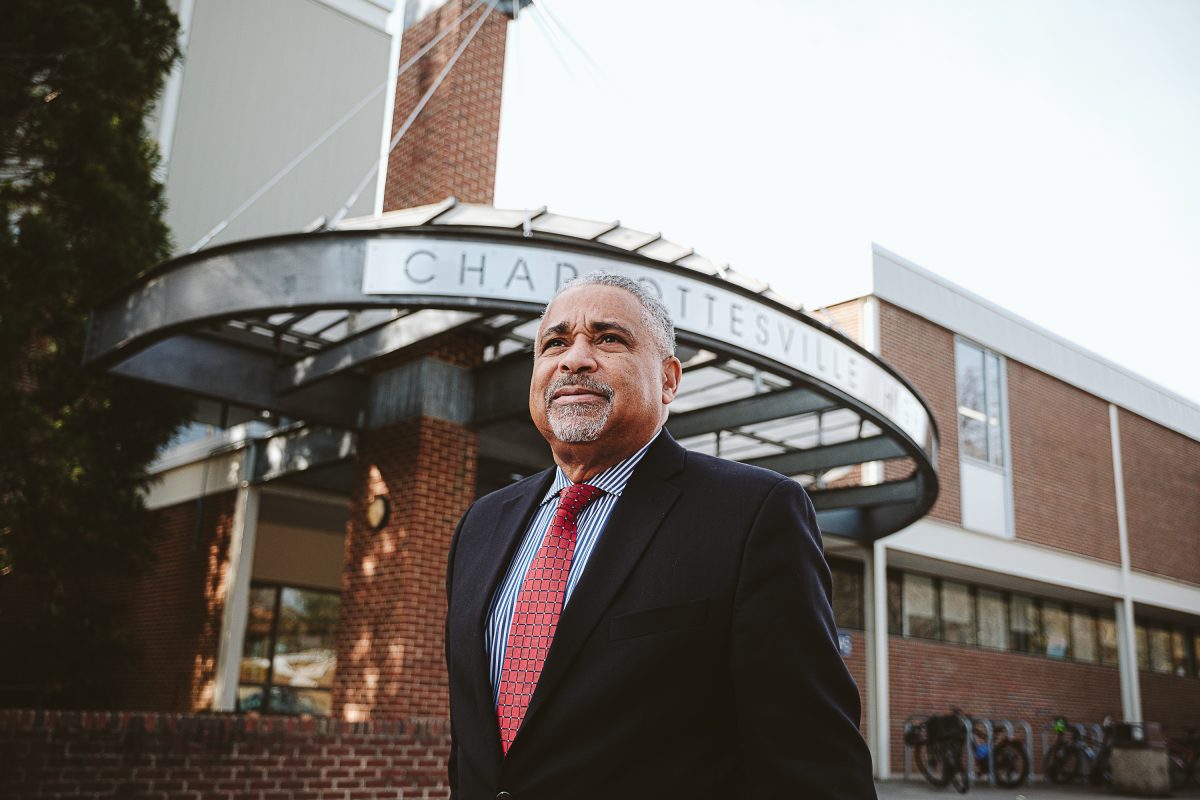By Yasu Shinozaki
“Kenny grew up in Charlottesville,” says Lois Burke, who has worked with Charlottesville High School interim principal Kenneth Leatherwood for many years.
This isn’t literally true, she clarifies. Leatherwood was raised in Tennessee and moved to Charlottesville when he was in his early 20s. But almost all of Leatherwood’s decades-long career as an educator and administrator has been in Charlottesville City Schools.
He started at CCS in 1977, when he was hired as a social studies teacher and JV basketball coach at Charlottesville High School. Leatherwood, who played basketball in college, went on to become head coach in 1981. He also served as social studies department chair and assistant athletic director. In the late ’80s he took a position as dean of students, and in 1993 he gave up coaching to become assistant principal. In 2003, Leatherwood became CHS principal and served in the position until 2008. After that, he worked for human resources at the central office and as director of the alternative educational institution Henry Avenue Learning Center, later renamed Lugo-McGinness Academy. He retired in 2013.
Since leaving CCS, he has returned to serve in numerous interim capacities: assistant principal of Clark Elementary, and principal of Venable Elementary, Greenbriar Elementary, and Walker Upper Elementary. Most recently, he stepped in at CHS after former principal Rashaad Pitt resigned in November.
Many students and faculty were familiar with Leatherwood, 69, before he returned to CHS last fall. Juniors and seniors remember him as their principal at Walker, while others knew him from when they were in elementary school at Greenbriar or Clark. Some current CHS teachers had him as a teacher or principal when they were high school students. Others recall working with him.
“I have great relationships with people from over the years,” Leatherwood says. “I talked to a lady today, she works with a nonprofit. … I didn’t have any idea who she was at the time. And it turned out, I was her history teacher in 1980, 1983 … and she remembered the class. She told me she appreciated me being here. … It made me feel pretty good about the relationships that I’ve built over the years and I guess that’s part of who I am.”
CHS teacher Lester Wainwright says Leatherwood’s community connections go beyond Charlottesville City Schools.
“He’s from the community,” Wainwright says. “He’s big into his church and his wife [is] also. And so … they have Sunday dinners … and a lot of people come, so they know a lot of people. And I think that’s made the difference here.”
Leatherwood arrived most recently at CHS in the midst of November’s “hard reset,” which was spearheaded by the school administration after numerous fights and other incidents resulted in teachers calling in sick and the school closing for three days. Wainwright and Burke both say Leatherwood’s connections to the school and community helped ease tension in the aftermath.
“It was almost like the building took a sigh,” Burke says. “Everybody knows him in the community, even though he wasn’t born here. … I think that he’s just such a part of the community that people feel really comfortable with him and they know that he’s going to call it like he sees it. And as a teacher, that’s the way he was with me in all of his roles. He was very honest and upfront.”
Burke says Leatherwood’s connections helped mobilize many community members to get involved in helping the school. During the hard reset, volunteers would walk the halls to provide support to students. She mentioned one former student and son of a former teacher who took time off from his Richmond job to volunteer.
“He told his office … ‘I need to be out for two days. My school’s in trouble. I want to go and see if I can help,’” Burke says. “And so he was here for two days, and he was here because he loves the school and he loves Kenny Leatherwood.”
While Burke emphasizes that changes to the school’s atmosphere could not be attributed to one factor, she notes that CHS has felt calmer since Leatherwood stepped in as principal. Leatherwood says he’s happy with the progress that has been made since the reset, but added that his role as an interim principal was not to make major or permanent changes, but rather to provide consistency and stability.
Burke and Wainwright say the role of interim principal has been difficult for others in the past, but Leatherwood’s familiarity with the school, its faculty, and its student body has helped. Leatherwood says his primary strengths as principal lie in his ability to connect with students and staff. As a teacher, Burke says she feels supported by Leatherwood.
“He’s very much a teacher’s principal,” she says. “He wants the teachers to do well. He wants them to build relationships with the kids. He wants to support them. He’s fiercely loyal to his staff and to the teachers that work with him.”
The school is in the process of searching for a permanent principal to begin in fall 2024. Both Wainwright and Burke say they would like someone with experience and who would commit to serving in the position a long time.
Wainwright says he’d like “somebody from the community, possibly. [Someone] that knows Charlottesville, because Charlottesville is a different animal. Anybody that comes from outside moving in, it takes a while to sort of figure out how this works.”
Leatherwood says a lot has changed since he arrived at CHS. In 1977, the minimum age to buy tobacco products was 16 and there was a designated smoking area for students. Over the years, he’s seen many clothing and hairstyles come and go, and some return. But a lot, he says, remains the same.
“I’ll just say that kids are kids and students are students,” he says.
According to Leatherwood, this will be his last role in the Charlottesville City Schools—though he’s said that before.
